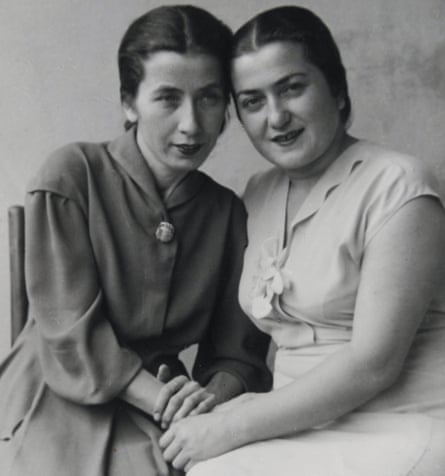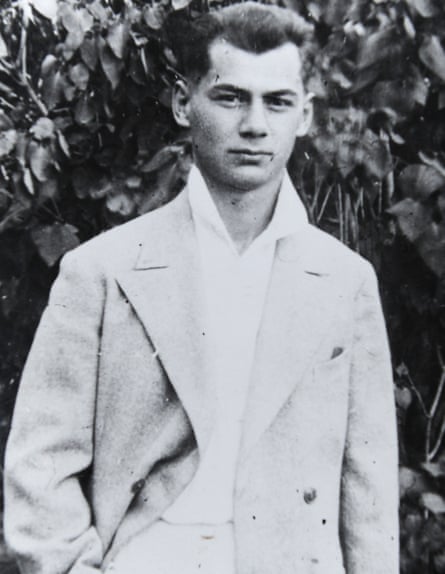Tiko Tuskadze grew up in Tbilisi in the Soviet republic of Georgia as an only child in a family where food dominated. She had two formidable grandmothers: one who loved to cook and one who hated it. Both had a ritualistic approach to mealtimes. “My mother’s mother, Pati, was very different to the other side of the family,” she says. “For her, food was made because you had to eat. With Tina, my father’s mother, you lived for eating. She would say to her neighbours, ‘Don’t make anything for dinner, come to ours.’”
Tuskadze went on to introduce Georgian cuisine to London with her Little Georgia restaurants (in Hackney and Islington). Her aunt Nana, her father’s sister, is immortalised in Nigella Lawson’s book Feast: “Nana’s Hachapuri” is a tribute to the Georgian cheese bread that featured everywhere in Tuskadze’s childhood.
Her formative years sound like something out of Babette’s Feast: delicious, complex, magical food everywhere. (To be fair, Georgian food is not complicated, but features many, many ingredients.) When we meet at Little Georgia in Hackney, a giant plate of khachapuri appears instantly: it’s like the most delicious cross between pizza, foccaccia and cheese on toast. It’s so delicious and comforting that you can imagine it must be almost stressful to have this as your Proustian childhood food, not least because it’s impossible to get the right kind of cheese for it outside Georgia.
Nigella Lawson scoured the globe for a recipe before asking Nana for hers. Tuskadze says of her aunt: “The thing is, she didn’t have a recipe. She never wrote anything down.” All they could do was let Lawson into the kitchen and have her watch it being made. Lawson later wrote: “This is what I wanted: a cheesebread cooked by someone called Nana, who cooked from memory and the heart and not from a recipe book.”

Tuskadze has now put together her own book, Supra (“feast”), of recipes from her childhood, stories about her family and pictures of them raising toasts and sitting smiling at tables groaning with kebabs, dumplings and khachapuri. “When I was growing up, you could not find a family where there was not great food. Everybody had their own style and traditions. As many women as there were in Georgia, that’s how many cheese breads there were.
“My grandmother never wrote anything. If you asked her, ‘How do you make that?’ she didn’t know. She just made it. When I was growing up, I watched everyone make everything just by looking and by feeling. By instinct.”
Because Tuskadze, born in 1968, was an only child, she spent a lot of time observing adults. Plus, as was typical in many Soviet families in the 70s, her parents lived at her father’s family’s home. It was a busy household because her paternal grandfather was a popular party man. “My grandfather Vano [Tina’s husband], was a communist and a great believer in the system. His jobs were high up in the state apparatus. He could easily call up and say, ‘Twenty for dinner tonight.’ And he would bring people from all different parts of Russia to be entertained.”
His wife was not bothered by this, apparently. She relished it. “Tina was like a magician. She was the principal of a boarding school for blind children. She absolutely loved her job. But at 5pm she would go home and start her second job: cooking for all these people. It was a celebration all the time with her. People loved complimenting her on her food.”
She would head to the market on the way home and buy whatever looked good, without checking prices. (Her husband hated this and the pair avoided going to the market together as he would embarrass her by haggling.)
Tina would conjure endless pkhali (walnut pate with spinach, leek, shallot, beetroot); ajapsandali (aubergine stew) and chkmeruli (poussin in garlic and walnut sauce). The food would be made in vast quantities, partly because you never knew who was coming round and partly because it kept well.
“With Georgian food, you make it and you keep it and it tastes better the next day. In Britain, it was quite alien for me when I first came here and saw how you do things. Here they cook something and eat it all straightaway. In Georgia, you hope for leftovers.”

She would visit Pati, the grandmother who hated cooking, at weekends. “Pati made a vegetable soup with vermicelli. I did not like soup. I don’t think any child likes soup. But she would say, ‘Thirty spoonfuls of soup are necessary before you eat your main course.’”
Tiko would eat the spoonfuls – carefully counted out – very slowly and deliberately, hoping her grandmother would let her stop. She never did. Every meal had to start with soup.
The Tuskadzes’ family life was upended in the late 80s after perestroika, which eventually led to Tiko leaving Tbilisi for London in the 90s. “It was a very hard transition in Georgia at that time. Life changed radically. We had a house in Abkhazia and we lost it because of the civil war. The shock of the changes was huge.”
Food was in short supply. Both grandmothers stopped cooking. “There were times when we had to queue for bread. We had no gas. We had nothing to cook. Electricity was only on at certain times. I remember on the balcony of our apartment we had this huge cupboard where we kept preserves for winter. We made Bulgarian peppers. Red peppers preserved in tomato. We hardly ever opened them and no one liked them much. But I remember raiding this cupboard and finding this one jar of it and being so excited.”
At the time, she was working for the ministry of culture and looking after her paternal grandparents. She nursed them until they died, not moving out despite the fact that she was married. “They all used to say to me, ‘You’re so spoiled because you’re an only child. You don’t know how to do anything.’ But passively I had learned so much just by watching my grandmother. In the end I really made her proud.”
Eventually she realised she needed a big change in her life and followed a friend to London, not expecting to stay. Twenty years later, she runs her two restaurants and, having remarried to a Brit, has a daughter, Elizabeth, who is eight. Her mother moved over from Tbilisi to live nearby. She worries sometimes that she has gone native and lost the sense of her original home. “Unfortunately, we don’t spend a lot of time in Georgia now. My daughter has become too English and it is really hurting me in a way.”
Most of her memories are now tied up in the food she cooks, she says. She’s happy with it that way. “I went back to our family house in Georgia a year or so ago and there was a room that was locked. I was planning to do some refurbishments and rent it out and I needed to open that room. I thought it would be so emotional and I was prepared for that. When they opened the door, I saw the piano with pictures on it and nothing had been moved for years. Just dust everywhere. Strangely, I felt nothing. I didn’t have any emotions. I thought, ‘What is happening to me? Am I becoming cold? Am I less sensitive?’ And I realised that the walls and all these things, they didn’t mean anything to me any more. I realised: I just miss the people. Then I thought, ‘You know what? I carry these people with me constantly in my memory.’ The only things that are left of value, I carry them with me.”
She adds: “The funny thing, is we live in a part of London where there’s a great sense of community. Neighbours are in and out of each other’s houses, they come round for dinner … It reminds me of what it was like growing up. A friend of mine who lives in west London came round and said, ‘I don’t know any of my neighbours. But this is like Georgia.’ So it feels like being at home.”

Comments (…)
Sign in or create your Guardian account to join the discussion